I met with Ashish Ghadiali, of Radical Ecology, and writer, filmmaker, activist and now curator, and Ben Borthwick, Head of Creative Programmes at KARST, in Plymouth in October to learn more about Against Apartheid, the current show at the arts space in Plymouth. Ashish is an activist – he founded Radical Ecology, is a regular contributor for The Guardian and The Observer and a grassroots organiser.
Against Apartheid is Ashish’s first step into arts curation although he has been working with arts production in film and curating activist events throughout his career. For this piece, which forms the first of an IFLA! two-part mini-series on climate curation and exhibition, I spoke with Ashish about the show and his work more broadly, covering community-building, art as research and inviting scientists into galleries. Ashish spoke so beautifully about his own work, the work of the other artists involved, and the circumstances through which the project came about, that I thought it best that the piece be relayed from his perspective.
Exhibition and curation
Against Apartheid is open until the 2nd December 2023 at in Plymouth. The exhibition features work by Alarm Phone, Anti-Raids, Angela Camacho, Kedisha Coakley, Iman Datoo, Annalee Davis, Forensic Oceanography, Sylvie Sema Glissant, Ashanti Hare, Khaled Jarrar, Kiluanji Kia Henda, Grada Kilomba, Otis Mensah and Sue Williamson. It is curated by Ashish Ghadiali.
It all emerged from a pool of conversations. I was part of a collective called Wretched of the Earth – in 2019, we did this open letter to Extinction Rebellion that set out what climate justice is…
Off the back of it, we were invited to deliver workshops all over the country on climate justice. I went into those conversations with universities and with academics as an activist, and became involved with the COP26 Civil Society Coalition, organising all of the grassroots. While we were lobbying the Cabinet Office in the run up to the event, I was asking what we wanted out of one particular meeting. It became about the 1.5° stated by the government and how we're gonna need to hold them to it. The thing that I noticed in the process of lobbying was that all of the climate scientists and the government could tell you how much it would cost to limit global warming to 1.5° but nobody could tell you how much it would cost to breach 1.5°. And it meant that all of the decisions at a governmental level came across like that. It was the brown people at COP26 talking about the 1.5° and the white people that know about finance, you know, talking about finance. That's not practical.
So I went to the scientists and said ‘let’s generate the data on how much it will cost to breach 1.5°? Let's do this research project.’ And then it became a cultural project. Kili (Kiluanji Kia Henda, Against Apartheid artist) was in the room and Iman (Iman Datoo, Against Apartheid artist) was facilitating the meeting. The next day, we did a public platform and it became part of a public conversation.
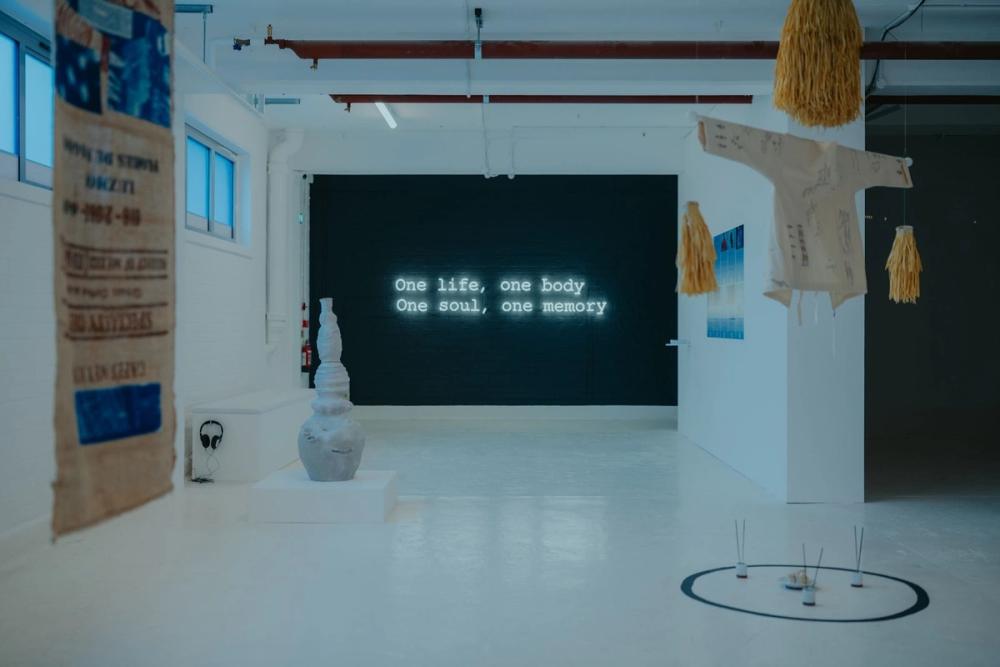
I've not done an exhibition before, I'm a filmmaker and I've got my own practice. But each bit of work in the exhibition is a relationship that's actually very real in my life. I’ve organised the space in the same way that I would organise a collective gathering. I spend a lot of time making sure everyone in the room speaks. So there's a kind of underlying theory of facilitation in the exhibition – it's how a collective voice emerges.
Ben (Ben Borthwick, Head of Programme at KARST) was really good at bringing this into the installation – he took each work and literally massaged it into the room – another kind of facilitation. Moving around the space is about an intergenerational sharing of knowledge and experience and lived experience, but also thinking through decolonial theory.
I was happy to be the ghost in the machine. I was really excited about the agency – in loads of previous projects, I was anonymous, that was always the mode of operation. I need to exist in the space to actually bring it together but immersing myself in other people's practices has been the thrill of it.
The Community
Throughout the exhibition, which ran from late September and will conclude in early December, Ashish, Ben and the KARST team have organised workshops and events with the community. They invited local people to join the discussions that the exhibition is starting about the origins of climate apartheid and contribute to the developing knowledge and understanding being built by the collection of work. These have included panel discussions, talks and mapping workshops alongside academics and students at the University of Plymouth and local people.
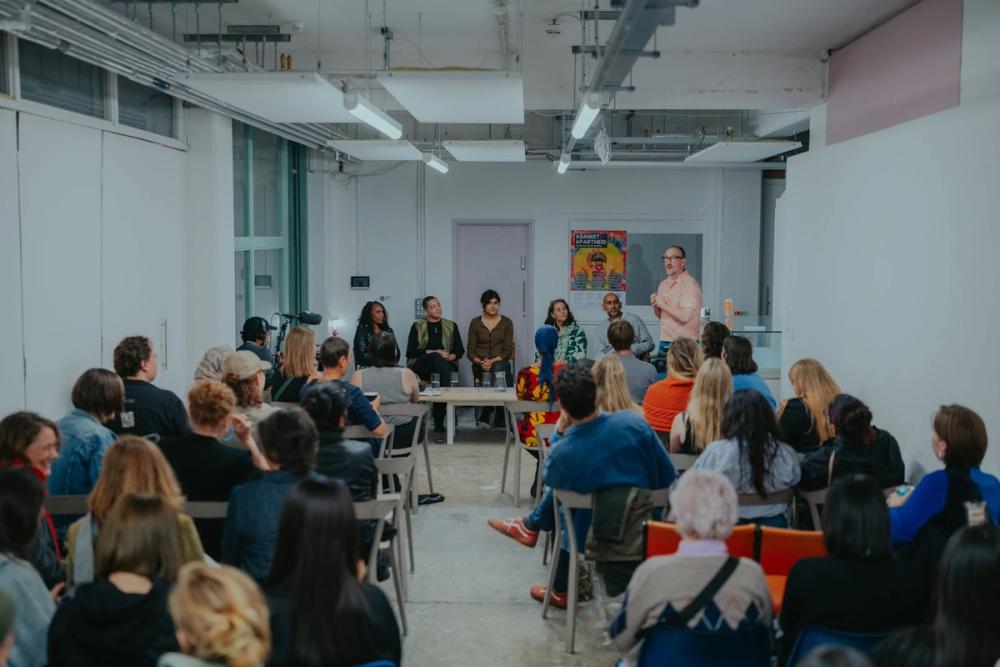
The organising of the space felt organic. There's a new kind of dialogue that has started between some of the work. It's less about the dialogue in the lead up and more about the show as a medium through which a dialogue has begun. There's a sense of something that's emerging. These are all artists whose work is rooted in decoloniality and environmental justice. There’s a process of going from an individual practice to a kind of a community that comes to you via an exhibition – there’s a whole set of values that we start to consider when we think about art in relation to the climate crisis. It’s all part of a dialogue around how we actually understand research and how it's disseminated.
All of this but then serves to build a sensibility in the city, just in the same way that that research is building a sensibility in the citadel of climate science around the blindness of the discipline to racial injustice. There’s a kind of community and vibe forming as people come in. People spill out of KARST into the pub and everyone's talking about decolonisation, but in a way that's really connected with their own lives. At the end of the Against Apartheid symposium in November, the exhibition will unfold as a public art performance – a silent walk through the city.
Looking Back; Moving Forward
Ashish has curated the space in a way that presents things we consider to be research or data alongside works of arts or creative responses to climate – we see heat maps next to printmaking, and anti-raid leaflets beside sculpture. We see global stories installed in the space, mapped in a city that has gained a title as ‘the city of discovery’.
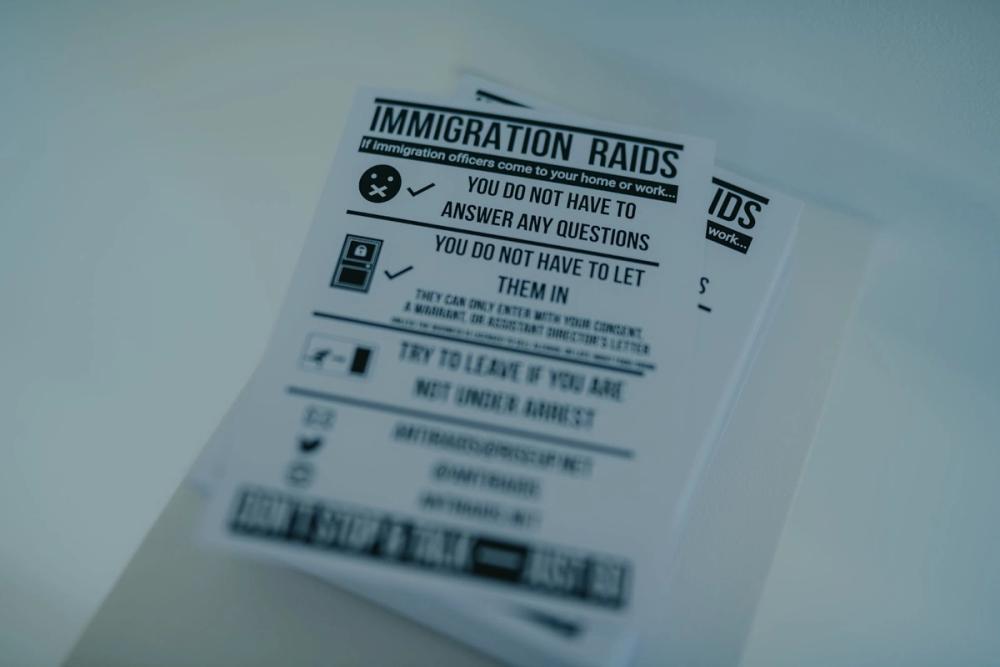
There are self-perpetuated mythologies that Plymouth has projected that are based on the city as a point of origin from which explorations happen. Histories including Sir John Hawkins and Sir Francis Drake feed into the maritime history and the rise of the global slave trade and colonialism. There’s something about sort of flipping that and making it about a point of arrival instead of departure.
Sometimes practitioners feel they have to dumb down into the art institutions because the curator might not be super comfortable with where they're actually coming from in their work. Here we flip it, and it's like actually, you know, everyone's at home in this exhibition. There is the building of a new kind of network or like rhizome of researchers and practitioners thinking about climate justice and decoloniality. And this is providing a space for people to engage and interact with those ideas
‘Art’ and ‘Science’
Ashish took this open invitation and expansive curation further when he talked about his understanding of the relationship between what we might think of as ‘art’ and ‘science’ and the academies that surround them. By engaging with a range of formats, and seeing ‘art’ as research and ‘science’ as creative, we can access the work in different ways.
Then there's the art world. We've got to understand that this is a structure of white supremacy that is totally complicit in climate breakdown. All of these institutions that are doing their big climate projects, it's programming. They are actually fundamentally engaged with venture capitalism, a funding structure, you know.
All of the stuff that you're pointing out actually asks how the work relates to where the practice is coming from and it’s underpinned by a vision that actually, our art can be rooted in our values and in our principles.
There's a problem in the entire intergovernmental conversation – it doesn't make sense. So let's frame it this way – one fifth of humanity will be displaced by 2100. That's a headline, and it became one you know; Forbes, Times of India, New York Times, Wall Street Journal. So they realise like, oh there’s value in Ash (Ashish Ghadiali) and maybe he'd be useful. It's like it's useful to have him there as a knowledge exchange component. And at that point, I'm like, oh they don't think I'm an academic, you know?
Once we’ve established that they think I don't understand these things, you know – do I go back and do a PhD in order to prove I know what I’m talking about, bowing to the structure of the academy? So yeah, I definitely feel a kind of lack of citizenship in that arena. I think I've always found it quite difficult in climate communication. There’s a framework for what climate data is and climate action wants artists all the time, but it wants us to illustrate their knowledge – it’s like a comms thing. Whereas I'm like actually, how do we get the climate scientists to come to Against Apartheid and sit here before they start developing their quantitative research trajectories? What happens if they, like, just sit in this room for four hours and then have a meeting with the artists in which they think about climate justice and decolonialism in the work. That’ll be uncomfortable for them but then I’m like, I felt uncomfortable in their science spaces. It felt really important for those people to be here and to understand, this is real serious, proper stuff – not an embellishment. But hey haven't been here yet, you know.
The moment that you let go of the notion of a fixed identity, the whole thing starts to move – it’s a kind of flattening of hierarchies, of disciplines? We have scientific infographics next to an activist leaflet next to deeply research-led portfolio of artworks. We get this range of different ways of organising information visually that are given equivalent value – they become so rich and dynamic in relation to each other.
We all hold a lot of value assumptions when we see anything, but we want to cut those lines between disciplines and formats, which is really exciting. A kind of undoing and redoing of how we might use visual culture.
Materials, Objects and Methods
As mentioned, Against Apartheid includes work of sculpture, film, audio, installation, illustration, print and photography. But Ashish is interested in the hands around the work and why they used a particular material, object or method.
This is not just a picture on a wall and that's not just an installation in a film. I wanted to create moments of encounter that touch on the tactility of the work – there's that phrase, head, hands, heart. For the hands, you know, we make things with our hands – for the artists, I think it’s essential to have a connect. You know, in Iman's (Iman Datoo, Against Apartheid artist) case, you know, the way that she talks about connecting with soil, you know, I think having her hands in the clay, she talks about it in the most beautiful way – she opens herself up to an experience of intimacy with another with another sort of form of life, you know, she talks about it like love, right?
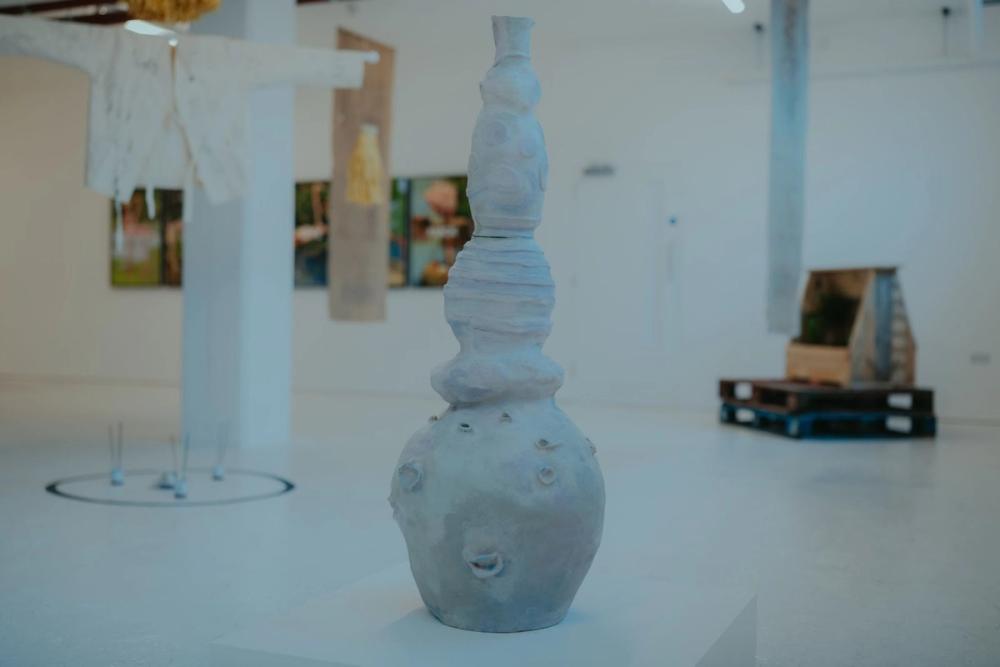
Annalee (Annalee Davis, Against Apartheid artist) is connecting through textiles as a kind of lineage, right? She's like thinking about enslaved women over time and the histories of the plantation practices that have connected generations over time, like the quilt makers of like the Mississippi.
There are objects and materials, but there are hands around them. And then it’s like, what are the hands connecting to?
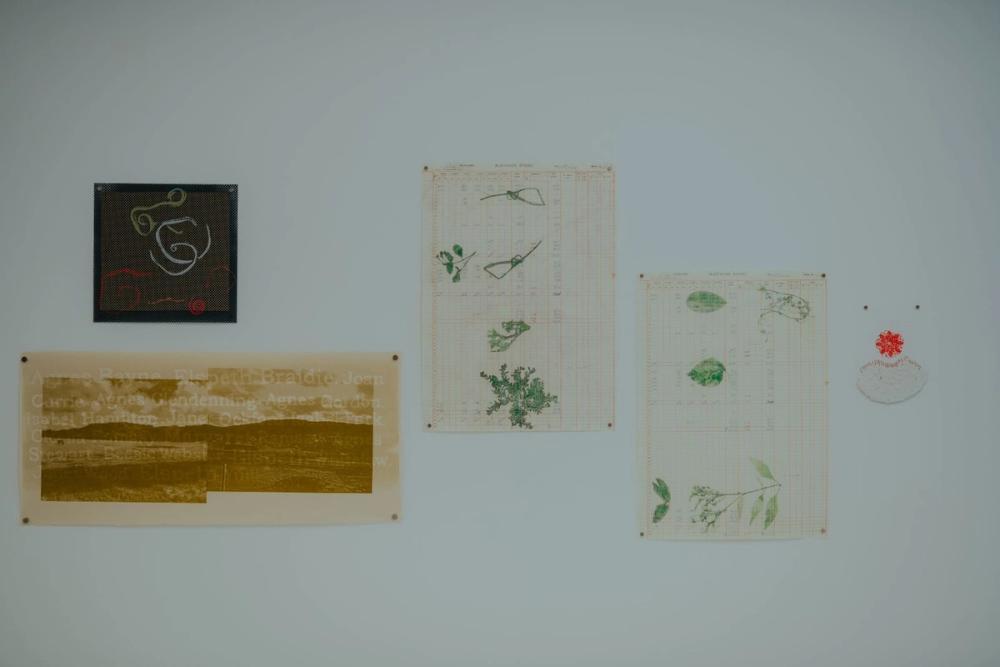
Time and Boundaries
The work in the exhibition feels as though it’s been presented as a whole; something new. When we move around the space, the lines between different works are blurred – we can hear, or pick up on something whilst we look at something else. The overlap challenges the boundaries traditionally drawn between curated works.
There’s a lot about futurism, right? We did a programme in the summer at the South Bank Centre called Migrant Futures, which was very much about Afrofuturism. Afrofuturism as an idea is quite often just being turned into identity politics plus a spaceship. Whereas actually like Afrofuturism is really literally about how we develop aesthetic strategies in relation to Black being that are shaped within these structures of white supremacy. How do you not just keep replicating that, but actually create this imaginative space in which new dimensions of existence can emerge.
If you think about human history over time, people have always been moving. The history of human life on Earth is actually of migrant futurism. It's not staying still in a moment of crisis and looking back but considering that what was taught by this culture doesn't hold anymore, and so we can leave, and a new futures emerge. I can feel this in the show – there’s this underlying disruption.
Ashish has also developed Black Atlantic, a weekend of public engagement where participants are invited to consider how far racial equity and inclusion can serve as creative tactics for the imagination of just and sustainable planetary futures here and now. It is happening in Plymouth on the 25 and 26th of November 2023.
Against Apartheid is in partnership with and supported by Arts Council England, Global Systems Institute and University of Exeter. It is open until the 2nd of December 2023 at KARST in Plymouth.
This has been part one of our mini-series on climate curation and exhibition. Part two is out now, documenting a conversation with the curation team of Acts of Gathering at The Eden Project, which focuses on some similar themes and questions – the grey area between art and science, community building, and the act of spanning time.
More Reads
Welcome to part two of an IFLA! two-part mini series on climate curation and exhibition (you can find the first here). In this second piece, It’s Freezing in LA! Art Editor and Co-Director Nina Carter meets with the Eden Project’s curation team. They discuss their recent exhibition, Acts of Gathering, which explores our changing relationship to food in the context of the climate crisis – and in the process continue our discussion of themes such as the grey area between art and science, community building, and the act of spanning time.
Keep reading >
Art
Climate and Exhibition: Acts of Gathering at The Eden Project
By Nina Carter(Interview)Art
Climate and Exhibition: Acts of Gathering at The Eden Project
Keep readingWelcome to part two of an IFLA! two-part mini series on climate curation and exhibition (you can find the first here). In this second piece, It’s Freezing in LA! Art Editor and Co-Director Nina Carter meets with the Eden Project’s curation team. They discuss their recent exhibition, Acts of Gathering, which explores our changing relationship to food in the context of the climate crisis – and in the process continue our discussion of themes such as the grey area between art and science, community building, and the act of spanning time.
By Nina CarterKeep readingArt
Review: Klima Biennale Wien
Keep readingIt's Freezing in LA! art editor and co-director Nina Carter reviews the first ever Klima Biennale Wien and finds refreshing storytelling, artist activist events and fictional speculations.
By Nina CarterKeep readingIf such a position existed, Olafur Eliasson might well be appointed as the Earth’s resident artist. Growing up in rural Iceland in the early 70s, his work is profoundly influenced by the natural phenomena and landscapes of his homeland. In this legacy piece, from Issue 4, Kiddy Grady interviews Eliasson, exploring the thought behind large-scale, immersive installations, and their attempts to reconnect us to nature: Waterfalls (2008) features artificial cascades in New York’s Hudson River; Moss Wall (1994) covers a giant canvas in delicate white lichen and Green River (1998) dyes waterways bright green. His work has been described as a kind of smoke and mirrors ‘technological sublime’ that invokes the spirit of the Romantics.
Keep reading >
Art
An Interview with Olafur Eliasson
By Kitty GradyArt
An Interview with Olafur Eliasson
Keep readingIf such a position existed, Olafur Eliasson might well be appointed as the Earth’s resident artist. Growing up in rural Iceland in the early 70s, his work is profoundly influenced by the natural phenomena and landscapes of his homeland. In this legacy piece, from Issue 4, Kiddy Grady interviews Eliasson, exploring the thought behind large-scale, immersive installations, and their attempts to reconnect us to nature: Waterfalls (2008) features artificial cascades in New York’s Hudson River; Moss Wall (1994) covers a giant canvas in delicate white lichen and Green River (1998) dyes waterways bright green. His work has been described as a kind of smoke and mirrors ‘technological sublime’ that invokes the spirit of the Romantics.
By Kitty GradyKeep reading- Read more